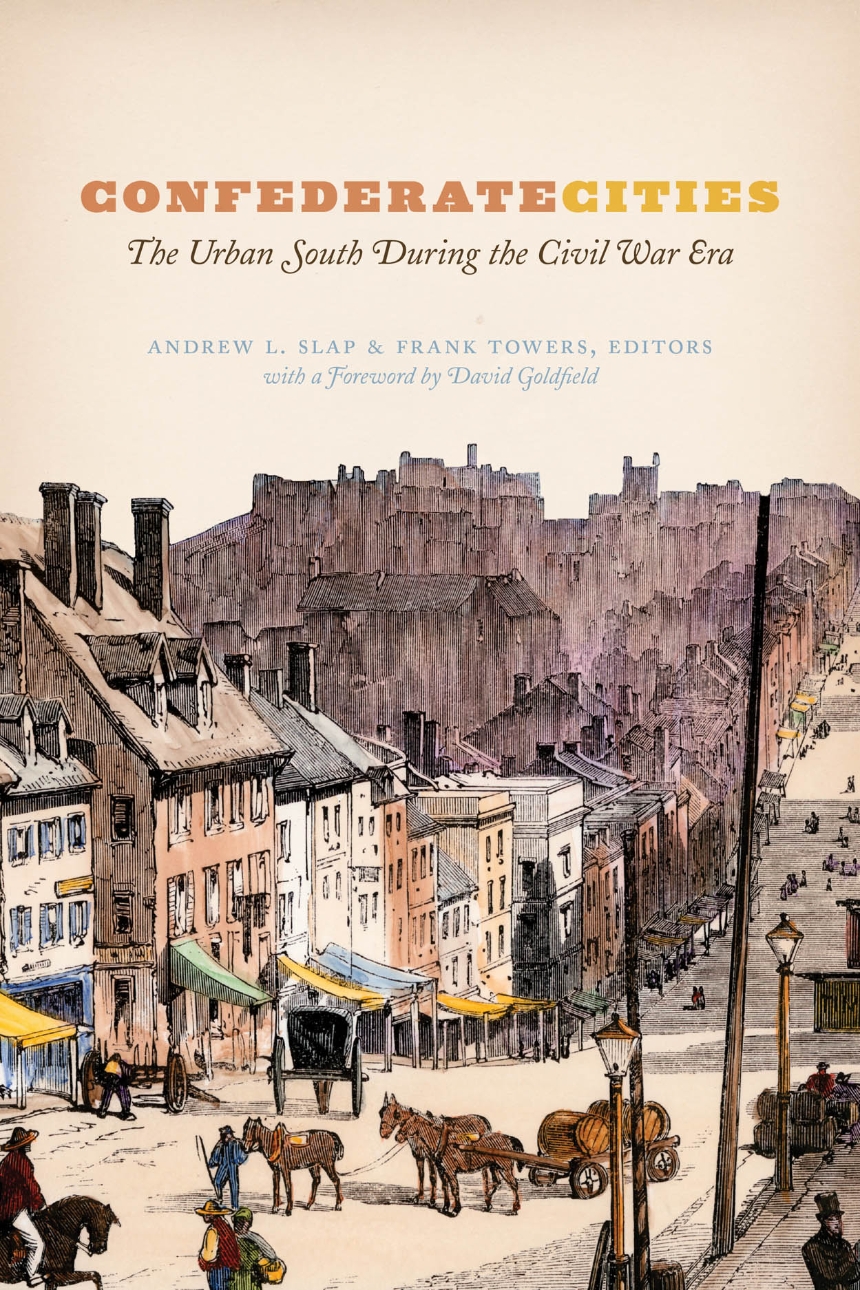Confederate Cities
The Urban South during the Civil War Era
9780226300207
9780226300177
9780226300344
Confederate Cities
The Urban South during the Civil War Era
When we talk about the Civil War, we often describe it in terms of battles that took place in small towns or in the countryside: Antietam, Gettysburg, Bull Run, and, most tellingly, the Battle of the Wilderness. One reason this picture has persisted is that few urban historians have studied the war, even though cities hosted, enabled, and shaped Southern society as much as they did in the North.
Confederate Cities, edited by Andrew L. Slap and Frank Towers, shifts the focus from the agrarian economy that undergirded the South to the cities that served as its political and administrative hubs. The contributors use the lens of the city to examine now-familiar Civil War–era themes, including the scope of the war, secession, gender, emancipation, and war’s destruction. This more integrative approach dramatically revises our understanding of slavery’s relationship to capitalist economics and cultural modernity. By enabling a more holistic reading of the South, the book speaks to contemporary Civil War scholars and students alike—not least in providing fresh perspectives on a well-studied war.
Confederate Cities, edited by Andrew L. Slap and Frank Towers, shifts the focus from the agrarian economy that undergirded the South to the cities that served as its political and administrative hubs. The contributors use the lens of the city to examine now-familiar Civil War–era themes, including the scope of the war, secession, gender, emancipation, and war’s destruction. This more integrative approach dramatically revises our understanding of slavery’s relationship to capitalist economics and cultural modernity. By enabling a more holistic reading of the South, the book speaks to contemporary Civil War scholars and students alike—not least in providing fresh perspectives on a well-studied war.
336 pages | 1 line drawing | 6 x 9 | © 2015
Historical Studies of Urban America
History: American History, Urban History
Reviews
Table of Contents
Acknowledgments
Foreword
David Goldfield
Introduction: Historians and the Urban South’s Civil War
Andrew L. Slap and Frank Towers
Part One: The Big Picture
1. Regionalism and Urbanism as Problems in Confederate Urban History
J. Matthew Gallman
2. Urban Processes in the Confederacy’s Development, Experience, and Consequences
David Moltke-Hansen
Part Two: Secession
3. To Be the “New York of the South”: Urban Boosterism and the Secession Movement 77
Frank towers
4. Gender and Household Metaphors in Mid-Nineteenth-Century Nation-Building Cities
T. Lloyd Benson
Part Three: Gender
5. Stephen Spalding’s Fourth of July in New Orleans
Michael Pierson
6. “More like Amazons than starving people”: Women’s Urban Riots in Georgia in 1863
Keith S. Bohannon
Part Four: Emancipation
7. African American Veterans, the Memphis Region, and the Urbanization of the Postwar South
Andrew L. Slap
8. Black Political Mobilization and the Spatial Transformation of Natchez
Justin Behrend
9. African Americans’ Struggle for Education, Citizenship, and Freedom, in Mobile, Alabama, 1865–1868
Hilary N. Green
Part Five: A New Urban South
10. Invasion, Destruction, and the Remaking of Civil War Atlanta
William A. Link
11. Freeing the Lavish Hand of Nature: Environment and Economy in Nineteenth-Century Hampton Roads
John Majewski
Conclusion: Cities and the History of the Civil War South
Andrew L. Slap and Frank Towers
Contributors
Index
Foreword
David Goldfield
Introduction: Historians and the Urban South’s Civil War
Andrew L. Slap and Frank Towers
Part One: The Big Picture
1. Regionalism and Urbanism as Problems in Confederate Urban History
J. Matthew Gallman
2. Urban Processes in the Confederacy’s Development, Experience, and Consequences
David Moltke-Hansen
Part Two: Secession
3. To Be the “New York of the South”: Urban Boosterism and the Secession Movement 77
Frank towers
4. Gender and Household Metaphors in Mid-Nineteenth-Century Nation-Building Cities
T. Lloyd Benson
Part Three: Gender
5. Stephen Spalding’s Fourth of July in New Orleans
Michael Pierson
6. “More like Amazons than starving people”: Women’s Urban Riots in Georgia in 1863
Keith S. Bohannon
Part Four: Emancipation
7. African American Veterans, the Memphis Region, and the Urbanization of the Postwar South
Andrew L. Slap
8. Black Political Mobilization and the Spatial Transformation of Natchez
Justin Behrend
9. African Americans’ Struggle for Education, Citizenship, and Freedom, in Mobile, Alabama, 1865–1868
Hilary N. Green
Part Five: A New Urban South
10. Invasion, Destruction, and the Remaking of Civil War Atlanta
William A. Link
11. Freeing the Lavish Hand of Nature: Environment and Economy in Nineteenth-Century Hampton Roads
John Majewski
Conclusion: Cities and the History of the Civil War South
Andrew L. Slap and Frank Towers
Contributors
Index
